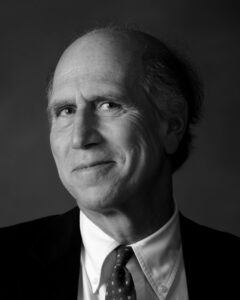 The grandson of Italian and French immigrants, Joseph Bathanti was born in 1953, in Pittsburgh’s working-class neighborhood of East Liberty. His father, Joseph D. Bathanti, was a union steelworker at Edgar Thomson Steel Works, the first steel mill Andrew Carnegie built in the United States; and his mother, Roselyn Bathanti, was a union seamstress. His mother and father are the two most fascinating people he’s ever known, and he writes obsessively about them.
The grandson of Italian and French immigrants, Joseph Bathanti was born in 1953, in Pittsburgh’s working-class neighborhood of East Liberty. His father, Joseph D. Bathanti, was a union steelworker at Edgar Thomson Steel Works, the first steel mill Andrew Carnegie built in the United States; and his mother, Roselyn Bathanti, was a union seamstress. His mother and father are the two most fascinating people he’s ever known, and he writes obsessively about them.
In the summer of 1976, fresh out of graduate school at the University of Pittsburgh, Bathanti arrived in North Carolina as a VISTA Volunteer, assigned to the North Carolina Department of Correction. During VISTA training in Atlanta, at the Georgian Terrace Hotel, at the introductory breakfast for new recruits, he met his beloved life-companion, Joan Carey, in the very space where the ballroom scene in Gone with The Wind was filmed. His year-long VISTA project site was Huntersville Prison, a dozen miles north of Charlotte. He instantly fell in love with the South – which he has referred to as his “spiritual home” – North Carolina, in particular, and he has lived here ever since. In a 2020 interview with Allen Mendenhall for the Southern Literary Review, Bathanti remarked: “I like to say that Pittsburgh is my beloved hometown, but North Carolina is my beloved home state.”
When asked to recount his life as a writer and teacher, he declares that not only was his first teaching job in a prison; but also, and more importantly, that teaching in prison was the beginning of his own schooling because it revealed to him, in very passionate and visceral ways, that his own formal university training hadn’t, that education, specifically reading and writing, is not only the most powerful and lasting avatar of intellectual growth, but also of emotional and social change.
His first teaching post was at Central Piedmont Community College in Charlotte (1977-85). Concurrently, during this time, he and Joan spent a year in Monroe, NC, as house-parents for abused and neglected children, many of whom were adjudicated youth and status offenders, under the auspices of Union County Department of Social Services.
Bathanti also spent four years (1985-87 and 1988-90) in the North Carolina Visiting Artist Program – the largest sustained gathering of artists under one banner in North Carolina history – in the rural counties of Anson, Union, and McDowell. His first book of nonfiction, They Changed the State: The Legacy of North Carolina’s Visiting Artists, 1971-1995, is a history of the Visiting Artist Program.
Over the years, he has read his work and spoken at the John F. Kennedy Center for the Performing Arts, Walter Reed National Military Medical Center, the Gerald R. Ford School of Public Policy at University of Michigan, and at colleges and universities, and libraries all over the country. But he’s also read, lectured, and conducted workshops in prisons, training schools, hospitals, domestic abuse shelters, shelters for the unhomed, daycare centers, nursing homes, soup kitchens, barns, gyms, train depots, Meals-on-Wheels sites, and fish camps.
In 2012, he was appointed by Governor Beverly Perdue North Carolina’s seventh Poet Laureate. During his stint as Poet Laureate, he began working with military veterans and their families throughout the state, and beyond, particularly with Vietnam combat veterans struggling with PTSD and other invisible wounds of war – work that he remains heavily engaged in. In January of 2016, he was named the Charles George VA Medical Center (Asheville, NC) Writer-in-Residence, becoming the first Writer-in-Residence in Veterans Administration history; and co-founded, with Dr. Bruce Kelly, the Medical Center’s Creative Writing Program. In 2016, he founded, at Appalachian State University, where he has taught since 2001, the Appalachian Veterans Arts & Humanities Collective, dedicated to providing hands-on arts and humanities programs and workshops to area veterans and their families.
In 2014, Bathanti was named the inaugural Senator John Heinz History Center Italian American Collection Scholar-in-Residence. Dr. Fred Gardaphe, the nation’s preeminent Italian American Literature scholar-critic, wrote in a review-essay of Bathanti’s work: “There is no doubt in my mind that Joseph Bathanti is one of the finest writers Italian America has produced.”
The author of over twenty books, across the genres of poetry, fiction, and memoir – as well as edited collections – Bathanti is the recipient of the 2016 North Carolina Award in Literature, the Order of the Longleaf Pine, and is a three-time recipient of the Roanoke-Chowan Prize, given annually by the North Carolina Literary and Historical Association for the best book of poetry published in a given year.
For many years, he directed Creative Writing at Appalachian State University, before joining Appalachian’s Department of Interdisciplinary Studies in 2018 as its inaugural McFarlane Family Distinguished Professor of Interdisciplinary Education and Writer-in-Residence of Watauga Residential College. He’s been awarded the University’s Provost’s Award for Excellence in Research, Scholarship, and Creative Activity; the Donald W. Sink Family Outstanding Scholar Award; and The Board of Governors Appalachian State University Excellence in Teaching Award.
See a list of Joseph Bathanti’s Books & Awards.
Read “Steady Daylight” by Joseph Bathanti
MEDIA
“Meet Joseph Bathanti, N.C. Poet Laureate:”
Myrtle Avenue Elementary School: Joseph Bathanti Visit (January 23, 2014):
Brothers Like These, a film about the creative writing program co-founded by Joseph Bathanti at Charles George VA Medical Center, in Asheville, NC, produced by Red Light Films & The Documentary Group, and directed by Academy Award-winning director, Ross Kaufman: takecare.org/inspiration/brothers-like-these/
In honor of the N.C. Arts Council’s 50th anniversary in 2019, 50 renowned artists with North Carolina roots were featured and each of them, including Joseph Bathanti, shared their North Carolina arts story and reflected on why public funding for the arts matters: www.ncarts.org/blog/2018/07/12/50-50-joseph-bathanti.
Joseph Bathanti Performs “Du Plessix,” Inspired by Jonathan Williams’s “Beauty and Beast”:
